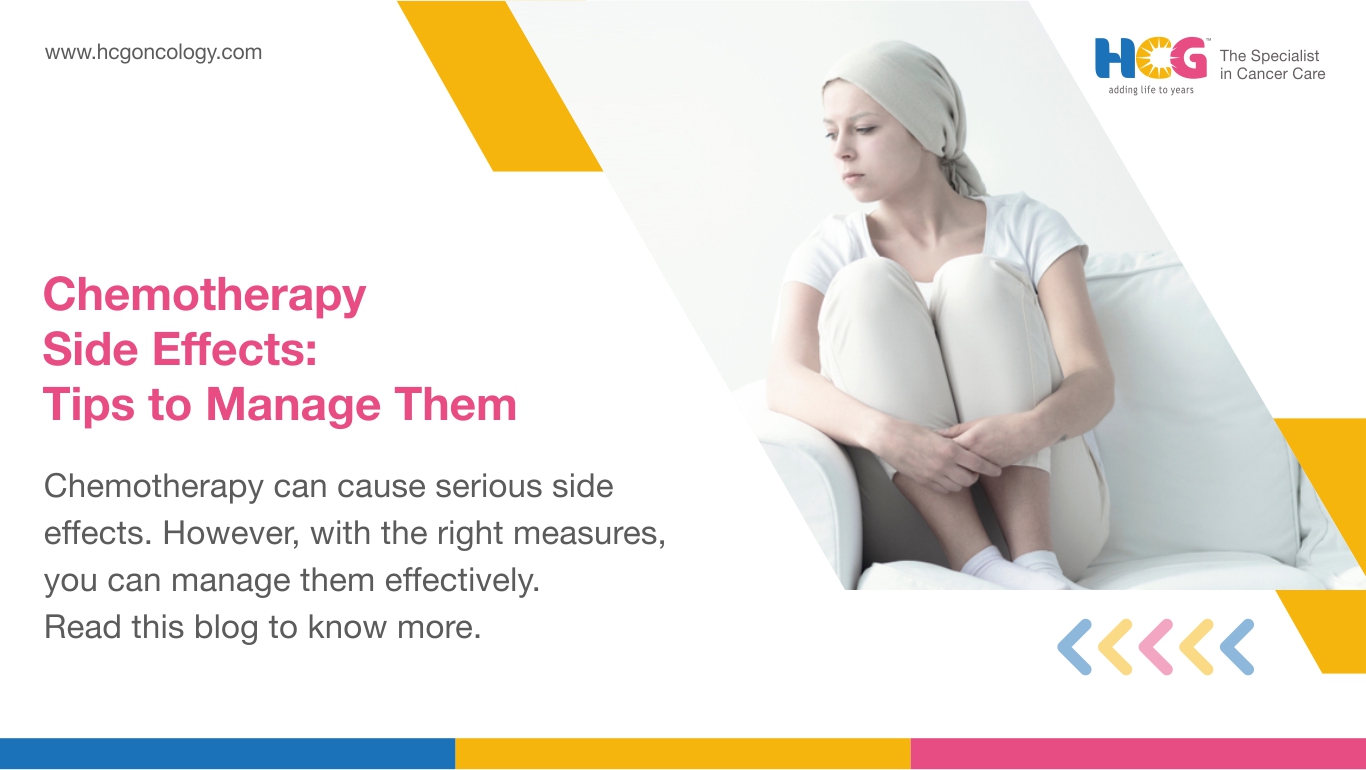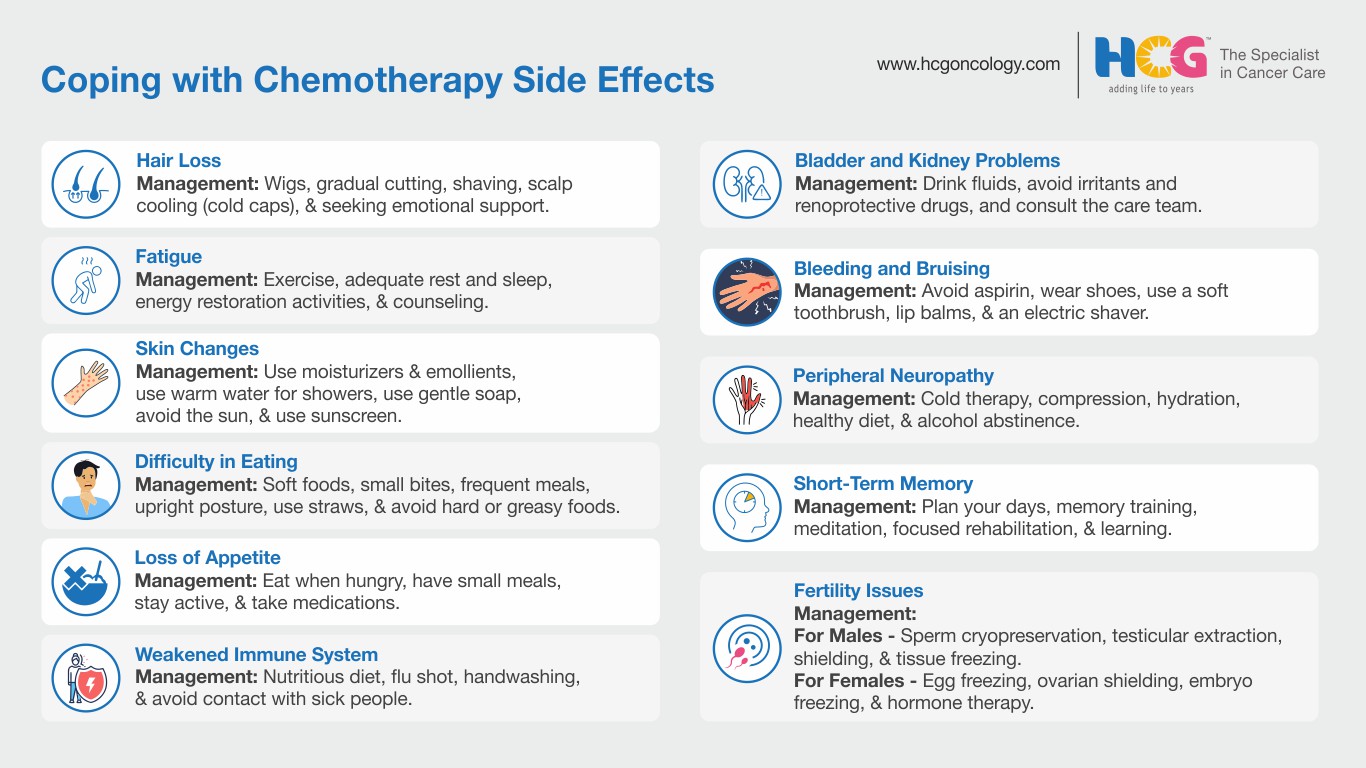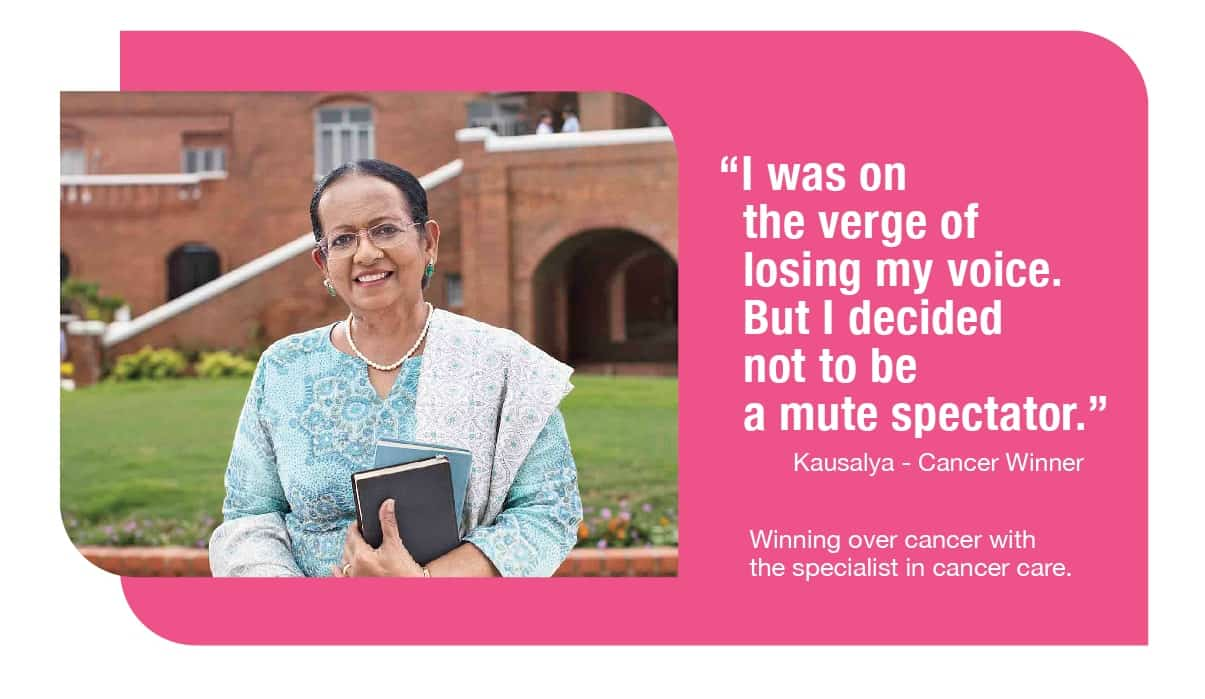
07 Nov, 2025
Feel free to reach out to us.

07 Nov, 2025

This article is medically reviewed by Dr. Satya Srinivas Appala, Consultant - Medical Oncology, HCG Cancer Centre, Vijayawada.
Patients undergoing chemotherapy treatment experience several side effects, such as hair loss, loss of appetite, compromised immune system, and infertility. Most side effects associated with chemotherapy are temporary and disappear once the therapy is completed. However, some chemotherapy side effects can be long-lasting, such as effects on the heart, nerves, and reproductive organs. This is largely because chemotherapy does not differentiate between cancer cells and healthy cells and causes toxic effects on the healthy cells.
Chemotherapy side effects are different from radiation side effects; however, some side effects may overlap.
The onset of chemo side effects depends on the type and dose of the drugs. However, many people experience nausea, mucositis, and fatigue within a few days of receiving chemotherapy. Patients may have different side effects during different chemotherapy cycles; for instance, the 1st chemo treatment side effects may differ from those of subsequent therapy.

Chemo drugs target the cells with rapid growth rates in the body. However, cells of the intestinal lining and hair follicles have a rapid growth rate, just like cancer cells, and chemotherapy drugs end up attacking these healthy cells along with cancer cells. This leads to various side effects, which may be mild to moderate.
Today, we have a broad range of chemotherapy drugs, and a good number of them are relatively more targeted and able to specifically identify and attack cancer cells. Some new-age chemotherapy drugs are also relatively less toxic.
That said, the following are the commonly observed chemotherapy treatment side effects:
Hair loss is one of the most common chemotherapy side effects. Patients undergoing chemotherapy may experience partial hair loss, loss of hair patches, complete hair loss, or hair thinning.
Not all patients undergoing chemotherapy experience similar patterns of hair loss. It depends on several factors, including the type and dose of the drug, the use of combination drugs, sensitivity to the drug, and the route of drug administration.
Hair loss is found to be one of the radiotherapy side effects too.
There are various measures that patients can take to manage hair loss due to chemotherapy. These include using wigs, gradually cutting the hair, and shaving off the head to avoid distress from severe hair loss. Some of the other techniques include scalp cooling therapy and cold caps, keratinocyte growth factor, topical vasoconstrictors, and low-intensity ultrasound. Once the chemotherapy is completed, the hair starts growing again.
Additional Reading: Here is an article by one of HCG’s specialists on how scalp cooling therapy during chemotherapy can help reduce hair loss: Scalp cooling therapy: Hair Loss Prevention During Chemotherapy.
Fatigue is one of the common chemotherapy adverse effects. Fatigue associated with cancer and chemotherapy reduces the patient's quality of life significantly. Several factors, such as molecular and physiological factors, inflammation, the immune system, reduced energy metabolism, comorbid conditions, and the hypothalamic-pituitary-adrenal axis, contribute to chemotherapy-related fatigue. Fatigue also occurs as one of the after-effects of radiotherapy.
Chemotherapy-related fatigue may be managed through various non-pharmacological and pharmacological interventions. Non-pharmacological interventions include exercises, education, and cognitive-behavioral interventions. Clinicians determine the root causes of fatigue and treat them through pharmacological interventions. At times, cancer or its treatment can cause anemia, insomnia, pain, and emotional distress, and doctors will recommend appropriate interventions.
Patients undergoing chemotherapy experience various skin-related chemotherapy side effects. These include pruritus, skin rash, xerosis, mucositis, and paronychia. The patient may also have erythema multiforme and toxic epidermal necrolysis.
Clinicians should educate the patients about the preventive measures to minimize the effects of chemotherapy on the skin. It is important to moisturize the skin to avoid xerosis. Wash the skin with warm water and use gentle soap. Avoid the sun. If it is not possible to avoid the sun, apply sunscreen with SPF 30 to protect the skin from sun damage. Limit the shower time, avoid alcohol-based lotions, use gentle cleansers, avoid irritating products, and use emollients regularly.
Patients undergoing chemotherapy have trouble eating due to various reasons, such as loss of appetite, mucositis, nausea and vomiting, swallowing difficulty, and a change in taste. Swallowing difficulty may be caused by chemotherapy-induced damage to the tongue, mouth, and esophagus.
Some of the measures that may help manage eating difficulties are eating soft and smooth food, taking small bites and chewing it properly, consuming small meals frequently during the day, sitting upright while drinking and eating, using straws for soft foods and liquids, and avoiding foods that require significant chewing.
Loss of appetite is also a common chemotherapy side effect. It is caused by taste changes, fatigue, nausea and vomiting, and oral sores. The chemicals released by the cancer cells that alter hunger also cause loss of appetite.
Patients undergoing chemotherapy should eat only when they feel hungry and avoid waiting for the scheduled mealtimes, consume small meals frequently during the day, avoid drinking too much fluid during eating, remain active, and take the medications for nausea and vomiting (if prescribed) at least 30 minutes before taking diet.
Chemotherapy drugs can damage the immune system by reducing the number of white blood cells, which play an important role in fighting pathogens. Thus, people undergoing chemotherapy are at increased risk for infection.
Some of the measures that help manage the weakened immune system are eating a nutritious diet, getting the flu shot as scheduled, asking the oncologists about any protective drug (prophylactic antibiotics), washing hands regularly, avoiding contact with sick people, limiting visits to public places or crowded places, and reporting any sign of infection to the oncologist.
Several patients experience effects on the bladder and kidney functions due to chemotherapy. Chemotherapy may cause cystic change, papillary necrosis, interstitial nephritis, hemorrhagic cystitis, acute tubular necrosis, urothelial changes, and infarction. Patients may experience blood in their urine, increased risk for urinary tract infection, and trouble emptying the bladder.
Some of the measures to overcome bladder and kidney problems caused by chemotherapy are drinking an adequate amount of fluid, avoiding foods that irritate the urinary system, such as spicy foods, caffeine, and tobacco products, asking the oncologists about reno-protective drugs, managing other underlying health conditions, and undergoing dialysis (if recommended).
Patients undergoing chemotherapy may experience bleeding and bruising because of the low number of platelets. Platelets are the blood cells that help in stopping bleeding.
Patients should avoid taking certain medications, such as ibuprofen or aspirin, that increase the risk of bleeding. They should also take extra care to avoid bleeding, such as wearing shoes, brushing with a soft toothbrush, avoiding encounters with sharp objects, preferring an electric shaver over a razor, and using lip balm to prevent bleeding from the lips. Contact the doctor if the bleeding occurs and does not stop.
Chemotherapy also causes peripheral neuropathy. Patients experience pain, numbness, burning sensations, tingling sensations, and increased sensitivity to hot and cold. Risk factors include older age, vitamin deficiencies, diabetes, and a history of peripheral neuropathy.
Patients may ask about certain measures to minimize peripheral neuropathy, such as compression therapy and cold therapy. Certain medications are also effective in managing the symptoms of peripheral neuropathy. Patients are advised to drink sufficient water, consume a healthy diet, avoid alcohol, and manage underlying conditions, such as constipation and diabetes.
Patients undergoing chemotherapy may have a condition known as chemo brain. It involves problems with thinking, memory, and concentration. The changes in cognitive functioning may develop during or after the chemotherapy treatment.
Some measures that help management include planning the day, body and brain exercises, such as meditation and yoga, memory and thinking exercises, learning new things to improve concentration, and undergoing focused rehabilitation.
Chemotherapy may also cause fertility issues because of its damaging effects on the reproductive organs. Chemotherapy in females affects the ovaries, resulting in hormonal imbalance and preventing the release of mature eggs. Chemotherapy in males damages the sperm and affects the health of sperm-forming cells.
Some of the measures to preserve fertility in males include sperm cryopreservation, testicular sperm extraction, testicular shielding, and testicular tissue freezing. Some of the fertility-preserving options in females are ovarian tissue freezing, egg freezing, gonadotropin-releasing hormone agonist, ovarian transposition, embryo freezing, ovarian shielding, and radical trachelectomy.
HCG Cancer Centre offers advanced chemotherapy services to patients diagnosed with different types of cancer. This leading cancer treatment in India has all the facilities required to deliver chemotherapy drugs safely and effectively. The medical oncologists here are experienced in planning treatment based on the type and stage of cancer, the patient's overall health, and underlying medical conditions. HCG also has specialized expertise in managing chemotherapy side effects.
Chemotherapy causes several side effects. Some of the side effects of therapeutic and palliative chemotherapy include fatigue, hair loss, nausea and vomiting, compromised immunity, bleeding and bruising, infertility, bladder and kidney problems, and loss of appetite. Some measures to prevent side effects of chemotherapy are a healthy and nutritious diet, prophylactic management, exercise, and avoiding alcohol. Foods to avoid while on chemo are spicy foods and caffeine.

Dr. Satya Srinivas Appala
Consultant - Medical Oncology
MBBS, MD (General Medicine), DNB (Medical Oncology)
Dr. Satya Srinivas Appala is an accomplished medical oncologist with over a decade of experience in treating and managing different types of cancer using systemic therapies. He is available for consultations at HCG Cancer Centre, a leading cancer hospital in Vijayawada. He is also well-versed in performing both autologous and allogeneic bone marrow transplants for various hematological conditions.
To book an appointment with Dr. Satya Srinivas, please click here.
